How to Reduce Odors From Your Home Waste System
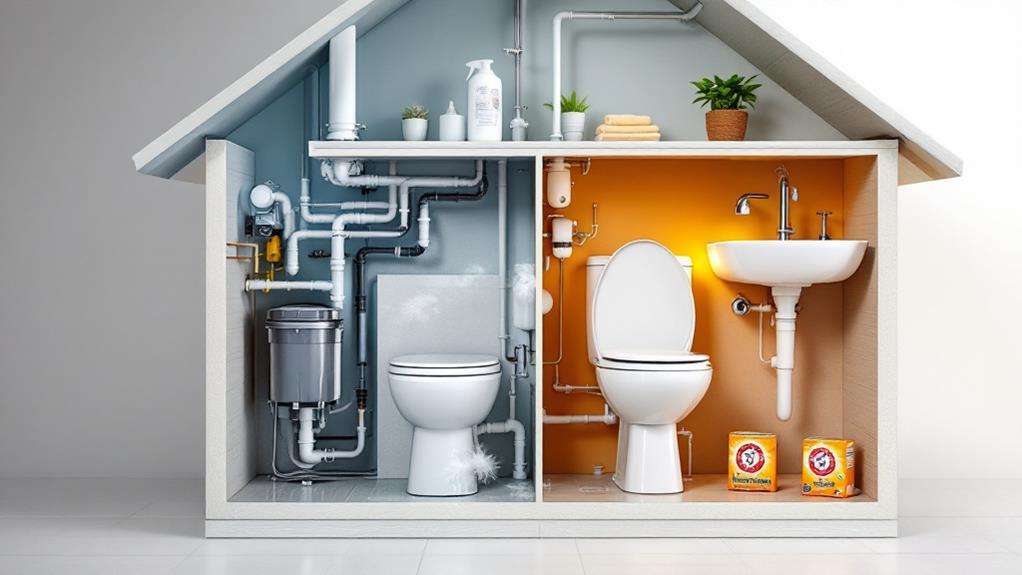
To reduce odors from your home's waste system, start by identifying the source through smell tracing and inspections. Implement regular cleaning routines, including drain maintenance and garbage disposal care. Use natural deodorizers like essential oils and baking soda, and guarantee proper ventilation with functioning exhaust fans and clear plumbing vents. Consider chemical treatments for persistent odors, but don't neglect proper septic system care if applicable. Maintain water seals in drain traps, and schedule professional inspections to detect hidden issues. Finally, employ odor-blocking products like activated charcoal filters to absorb lingering smells. By combining these strategies, you'll create a fresher, more pleasant home environment.
Identify the Odor Source
When dealing with unpleasant odors from your home's waste system, your first step is to pinpoint where the smell is coming from. Start by using your nose to trace the scent to its strongest point. This might lead you to a specific drain, toilet, or area of your home.
Next, identify airflow patterns in your house. Open windows and doors to create cross-ventilation, which can help you detect where the odor is most concentrated. Pay attention to how the smell intensifies or dissipates as you move through different rooms.
Inspect for debris buildup in drains, pipes, and toilet bowls. Use a flashlight to look for visible accumulations of hair, soap scum, or other organic matter that could be causing the odor. Don't forget to check less obvious places like overflow drains in sinks and tubs.
If you can't locate the source visually, consider using smoke tests or peppermint oil to detect leaks in your plumbing system. These methods can reveal hidden issues in walls or under floors. Remember, accurately identifying the odor source is essential for effectively addressing the problem and preventing future occurrences.
Regular Cleaning and Maintenance
Your home's waste system requires regular cleaning and maintenance to prevent odors and certify proper function. Establish a proper maintenance schedule to keep your plumbing in top shape. Start by cleaning your drains weekly with a mixture of baking soda and vinegar, followed by hot water. This helps prevent buildup and keeps odors at bay.
Don't forget about your garbage disposal. Run it regularly with cold water and grind citrus peels to freshen it up. Clean your toilet bowl and tank weekly, paying special attention to the rim jets where bacteria can accumulate.
Conduct periodic inspections of your pipes and fixtures to catch potential issues early. Look for leaks, cracks, or signs of corrosion. Check your vent stack on the roof to verify it's clear of debris and functioning correctly.
Consider having a professional plumber perform an annual inspection of your entire waste system. They can identify and address problems you might miss, such as hidden leaks or damaged pipes. By staying proactive with your cleaning and maintenance routine, you'll dramatically reduce odors and extend the life of your home's waste system.
Natural Deodorizing Solutions
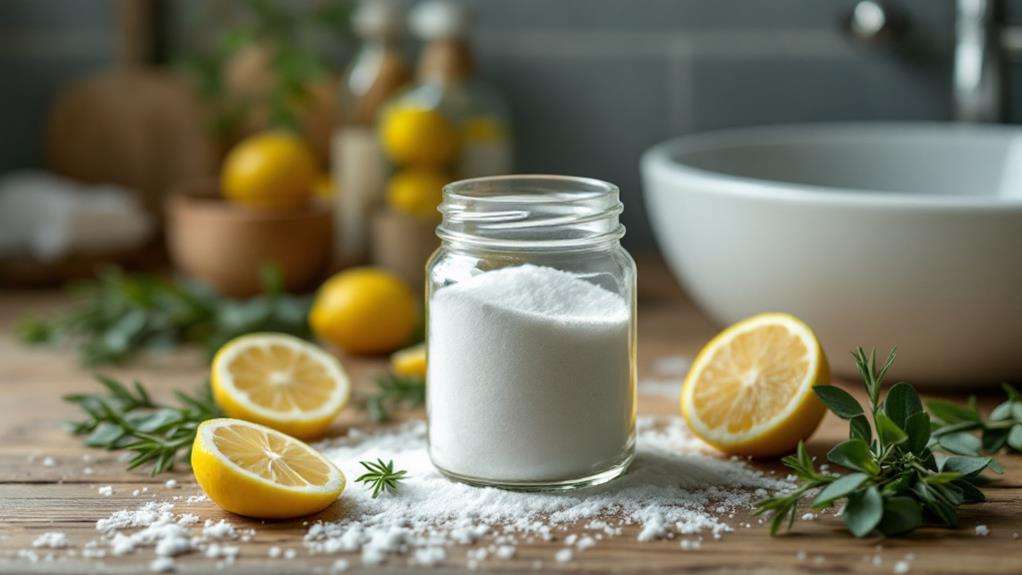
Several natural deodorizing solutions can effectively combat waste system odors without harsh chemicals. You'll find that essential oils and natural absorbers are your allies in this battle against unpleasant smells. Try placing a few drops of tea tree, lavender, or lemon essential oil on cotton balls and strategically positioning them near problem areas. These oils not only mask odors but also have antibacterial properties.
Natural absorbers like baking soda, activated charcoal, and white vinegar can work wonders in neutralizing odors. Sprinkle baking soda down drains or place open containers in bathrooms. Activated charcoal bags can be hung in discrete locations to trap odors. For a quick fix, boil white vinegar on the stove to eliminate lingering smells throughout your home.
Create a natural air freshener by simmering these items on your stovetop:
- Citrus peels, cinnamon sticks, and cloves
- Fresh herbs like rosemary and mint
- Vanilla extract and coffee grounds
- Apple slices and whole spices
These natural solutions not only reduce odors but also create a pleasant, inviting atmosphere in your home. By incorporating these methods into your regular cleaning routine, you'll maintain a fresher-smelling waste system without relying on artificial fragrances or harsh chemicals.
Proper Ventilation Techniques
A gust of clean air can work wonders for your home's waste system odors. Proper ventilation techniques are essential for maintaining a fresh-smelling environment and improving overall air quality control. Start by ensuring your bathroom exhaust fans are functioning correctly and running them for at least 30 minutes after each shower or bath. Consider installing timer switches to automate this process.
For more extensive ventilation system upgrades, look into whole-house ventilation solutions. These systems continuously exchange stale indoor air with fresh outdoor air, reducing odors and improving air quality throughout your home. Options include heat recovery ventilators (HRVs) and energy recovery ventilators (ERVs), which can also help maintain energy efficiency.
Don't forget about your plumbing vents. Make sure they're clear of obstructions and extend above your roof line to allow sewer gases to escape properly. If you're still experiencing persistent odors, consider installing additional vent pipes or air admittance valves to improve airflow within your waste system.
Regularly inspect and clean your air ducts to prevent the buildup of mold, dust, and other contaminants that can contribute to unpleasant odors. By implementing these ventilation techniques, you'll greatly reduce waste system odors and create a healthier living environment.
Chemical Treatments for Odors
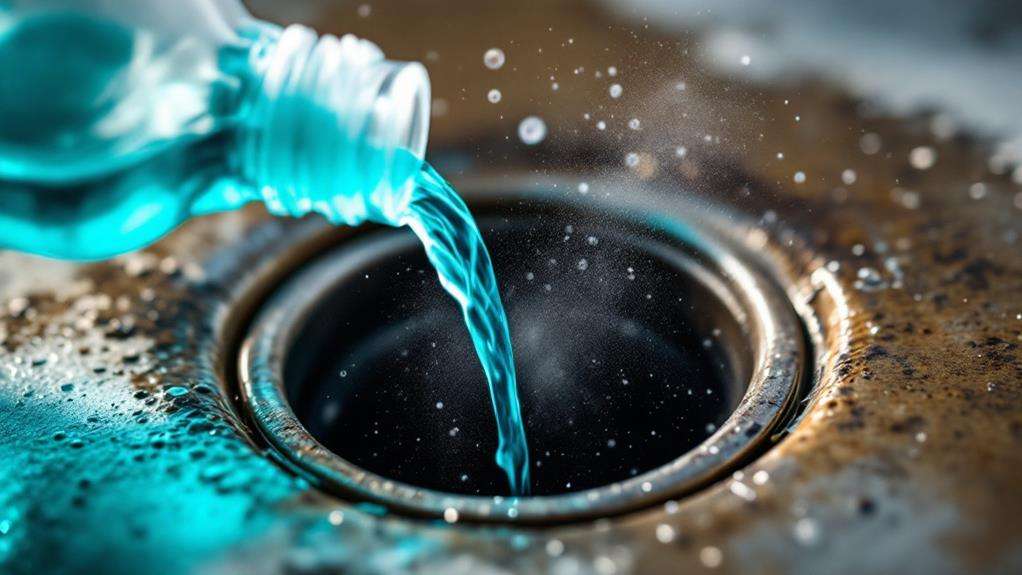
Armed with the right chemicals, you can effectively combat stubborn waste system odors. Chemical additives and odor reducing agents are powerful tools in your arsenal against unpleasant smells. These treatments work by neutralizing odor-causing bacteria or masking offensive scents with more pleasant fragrances.
When selecting chemical treatments, consider products specifically designed for waste systems. Look for enzyme-based formulas that break down organic matter, reducing the source of odors. You'll find various options, including:
- Liquid drop-in treatments for toilets and drains
- Powder formulas for septic systems
- Foam sprays for hard-to-reach areas
- Slow-release solid blocks for continuous treatment
Always follow the manufacturer's instructions for proper application and dosage. It is vital to use these products regularly for best results. While chemical treatments can be effective, they shouldn't replace proper maintenance and cleaning practices.
Remember that some chemical additives can be harsh on pipes and septic systems. Opt for eco-friendly options when possible to minimize environmental impact. If odors persist despite chemical treatments, it may indicate a more serious issue with your waste system, requiring professional inspection.
Plumbing Fixes and Upgrades
While chemical treatments can provide temporary relief, addressing underlying plumbing issues is often the key to long-term odor control. Start by inspecting your home's plumbing system for any leaks, cracks, or damaged pipes that could be allowing sewer gases to escape. If you're experiencing water pressure issues, this could indicate a problem with your main sewer line or vent stack, which may contribute to odors.
Consider upgrading your plumbing fixtures, especially if they're outdated. Fixture replacements, such as modern toilets with improved flushing mechanisms, can help reduce waste buildup and minimize odors. Install or repair p-traps under sinks and floor drains to maintain a water seal that prevents sewer gases from entering your home.
Check your home's ventilation system, ensuring that all vent pipes are clear and properly connected. If you have a septic system, regular maintenance and pumping are essential for odor prevention. For persistent issues, consult a professional plumber who can perform a thorough inspection and recommend specific upgrades or repairs customized to your home's waste system. By addressing these plumbing fixes and upgrades, you'll create a more efficient and odor-free waste management system in your home.
Septic System Care
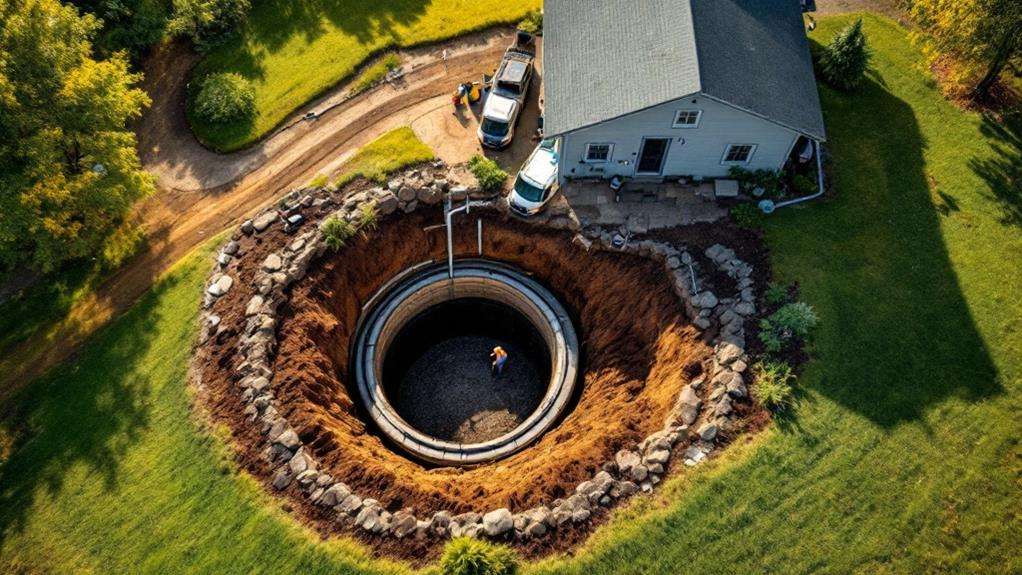
If you have a septic system, proper care is crucial for preventing odors and maintaining its functionality. Regular maintenance and mindful usage can dramatically reduce the likelihood of unpleasant smells and system failures.
First, be cautious about what you flush or pour down your drains. Avoid introducing harsh chemicals, grease, or non-biodegradable items into your septic system. These can disrupt the delicate balance of bacteria that break down waste.
Ensure proper soil aeration around your drain field. Well-aerated soil allows for better absorption and treatment of wastewater. You can improve aeration by:
- Avoiding parking vehicles on the drain field
- Redirecting roof runoff away from the area
- Planting shallow-rooted vegetation over the drain field
- Refraining from building structures on top of the septic system
Don't neglect septic system pumping. Schedule regular pump-outs every 3-5 years, depending on your household size and system capacity. This prevents solids from accumulating and causing blockages or overflows.
Lastly, conserve water to avoid overloading your septic system. Fix leaky faucets, use water-efficient appliances, and spread out your laundry loads throughout the week. By following these practices, you'll maintain a healthy, odor-free septic system.
Drain Traps and P-Traps
Drain traps and P-traps play an essential role in preventing sewer gases from entering your home. These simple yet effective devices are found beneath your sinks, showers, and toilets, creating a water seal that blocks odors from traveling up through the pipes. To maintain their functionality, you'll need to guarantee they're always filled with water.
If you notice unpleasant smells coming from your drains, it's possible that the trap has dried out or become ineffective. To remedy this, simply run water through the fixture for a few seconds to replenish the water seal. In cases of prolonged disuse, such as in guest bathrooms or rarely used sinks, make it a habit to run water through them periodically.
Be aware that drain blockages can also compromise the effectiveness of traps. Regular cleaning and avoiding the disposal of grease, hair, and other debris down your drains can help prevent clogs. Additionally, pipe corrosion can damage traps over time, leading to leaks and reduced efficiency. If you suspect corrosion or persistent odor issues, it's best to consult a professional plumber to inspect and, if necessary, replace your drain traps.
Professional Inspection and Assessment
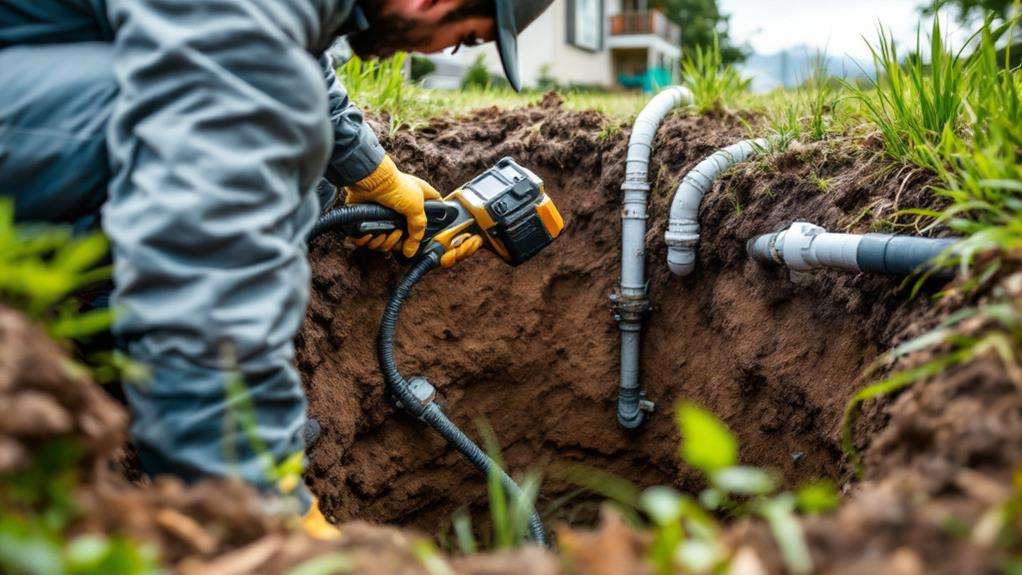
Despite your best efforts, persistent odor issues may require a professional touch. A plumbing expert can provide professional skill and conduct a thorough evaluation of your home's waste system. They'll use specialized tools and techniques to identify hidden problems that might be causing unpleasant smells.
When you hire a professional, they'll typically:
- Use cameras to inspect sewer lines and identify blockages or damage
- Perform smoke tests to detect leaks in your plumbing system
- Check for proper ventilation in your home's waste pipes
- Assess the overall condition of your septic tank, if applicable
During the inspection, the professional will examine all aspects of your waste system, including pipes, drains, and vents. They'll look for issues like cracked pipes, improper installations, or faulty seals that could be allowing sewer gases to escape. Based on their findings, they'll provide recommendations for repairs or upgrades to eliminate odors effectively.
Odor-Blocking Products
Odor-blocking products can be a quick and effective solution for managing unpleasant smells from your home's waste system. These products come in various forms, each designed to neutralize or mask odors in different ways.
One popular option is activated charcoal filters, which can be placed near drains or in problem areas. These filters absorb odor-causing molecules, effectively purifying the air. Another effective choice is enzyme-based cleaners, which break down organic matter responsible for foul smells. You can pour these down drains or use them to clean affected areas.
For a more pleasant ambiance, consider using scented candles or essential oil diffusers. While these don't eliminate the source of the odor, they can help mask unpleasant smells and create a more inviting atmosphere. Look for scents like citrus, lavender, or pine, which are known for their fresh and clean aromas.
Gel-based air fresheners and odor-absorbing bags are also effective options. Place these in bathrooms, near trash cans, or in other areas prone to waste system odors. Remember to replace these products regularly to maintain their effectiveness in combating persistent smells.
